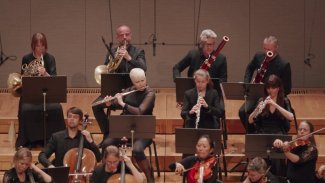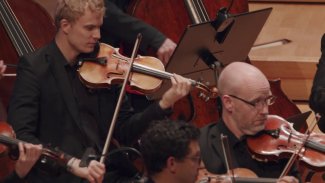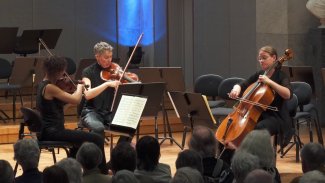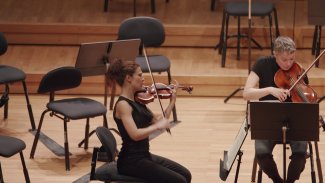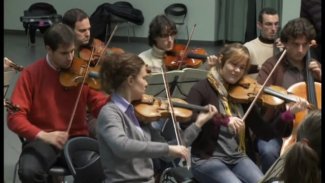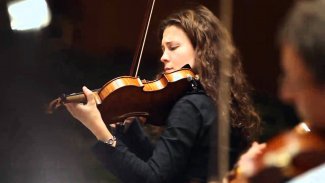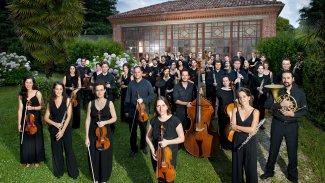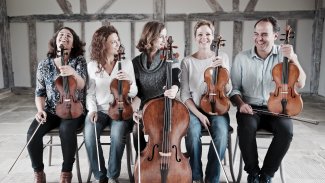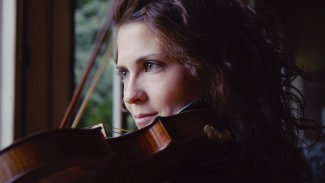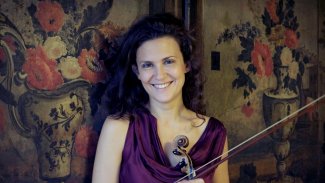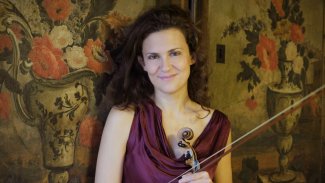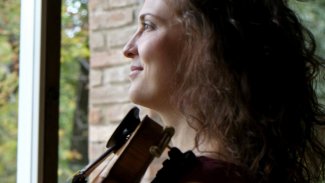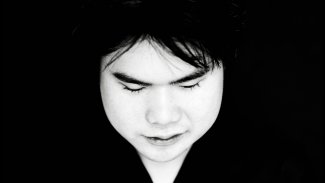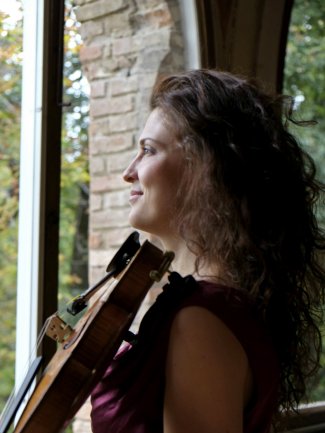
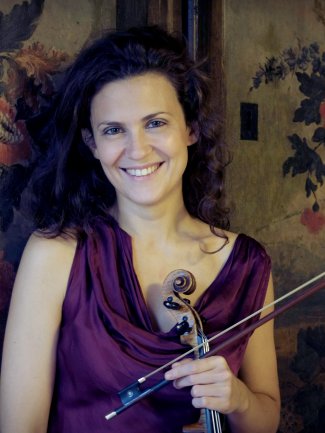
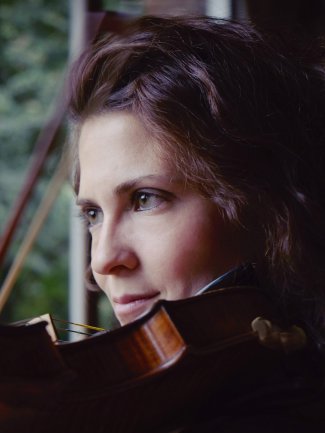
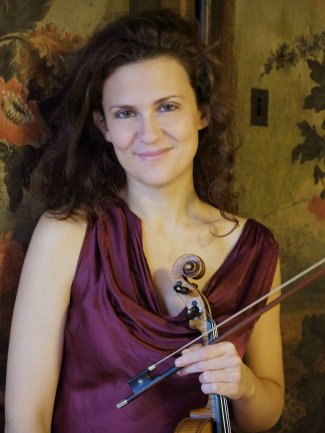





Lorenza Borrani
“Borrani was amazing in her solos, fiery and hypnotic yet tender and liquid as well.”
(Sydney Arts Guide, November 2016)
Artistic Partner: Arctic Philharmonic Orchestra
Artistic Partner: Västerås Sinfonietta
Lorenza Borrani’s inspiring programmes and inclusive approach in music making are recognized and appreciated by the world-renown orchestras. Alongside her orchestral activities, she is a committed chamber music partner in special projects with her close musical friends.
In the 2024/25 season, Lorenza Borrani returns to Ostrobothnian Chamber Orchestra with Schubert’s G major quartet in Borrani’s own orchestration, Norwegian Chamber Orchestra with Ursina Braun’s Violin Concerto, Scottish Chamber Orchestra, Bilbao Symphony Orchestra joined by cellist Julia Hagen in a programme combining Mozart, Haydn and Shaw and to the orchestras where she is the Artistic Partner: Västerås Sinfonietta joining forces with Simon Crawford-Phillips in Mendelssohn’s Double Violin and Piano Concerto, and Arctic Philharmonic Orchestra in two different periods in October and February including a week at the Arctic Chamber Music Festival in Svalbard. First appearances this season include Tapiola Sinfonietta and Wroclaw NFM Okiestry Leopoldinum. As a chamber musician, Lorenza is one of the founders of Spunicunifait which is dedicated to playing and recording Mozart’s string quintet works.
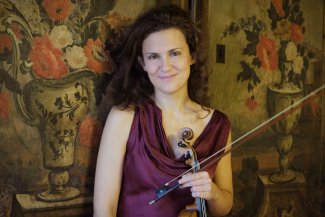
See more
Previous season’s highlights include her successful debut with Orchestre de Paris with Haydn’s Symphony Concertante and Symphony No.60 Le Distrait and Ligeti’s Kammerkonzert which she conducted. Lorenza Borrani’s long term chamber music partner and composer Ursina Braun has written a concerto for her which she premiered with Arctic Philharmonic in Norway and Musica Vitae in Sweden.
Aged 25, Lorenza Borrani was appointed the Leader of the Chamber Orchestra of Europe. Her work with Nikolaus Harnoncourt and Lorenzo Coppola inspired her love and knowledge of period performance practice. Her encounters with Lorin Maazel and Symphonica Toscanini, Claudio Abbado and Orchestra Mozart, where she also performed as a soloist, shaped her musical ideas and interests. As a soloist, she has collaborated with Trevor Pinnock, Yannick Nézet-Séguin and Bernard Haitink.
Lorenza is one of the co-founders of Spira Mirabilis, a laboratory for the preparation and performance of orchestral and chamber music repertoire of all periods, which works without a conductor or a leader. Their projects have included full opera of Nozze di Figaro, Beethoven’s Symphony No.9, fragments from Mozart’s Così fan tutte and the premiere of Colin Matthew’s Spiralling, in Aldeburgh.
Lorenza studied with Alina Company, Piero Farulli, Zinaida Gilels and Pavel Vernikov at the Scuola di Musica di Fiesole, and took the postgraduate course at the Kunstuniversität Graz with Boris Kuschnir. She is a Professor of Violin at the Scuola di Musica di Fiesole and a visiting professor at Royal Academy of Music in London since 2019.
HarrisonParrott represents Lorenza Borrani for worldwide general management.
Contacts
Jasper Parrott
Yasemin Kandemiroğlu
Tània Fogàs i Lomas
worldwide general management
“Lorenza Borrani led the Australian Chamber Orchestra with a style that always turned inwards to the music – its subtlety of phrasing, its expressive range and scope and its seriousness of utterance… Her arrangement of Prokofiev’s Violin Sonata No. 1 for violin and string orchestra retained the work’s originality and intimacy.”
“To have the audience leaning in, listening to the musical narrative, as guest director Lorenza Borrani does from bar one of the Australian Chamber Orchestra’s second tour for the year is really something… With Borrani directing with her focus on crisp articulation and style over swagger, Beethoven’s venerable
String Quartet No 16 becomes something quite different.”
“Borrani’s adaptation of Prokofiev’s Violin Sonata No.1 acted to amplify the work’s emotional polarities: the wild invention of Prokofiev’s harmonic and textural language was revealed and glancing blows of dissonance rebounded against itinerant cadences before yielding to more reflective lyricism. In the eye of this storm, Borrani’s robust yet sensitive playing offered a rock-steady anchor.”
“Borrani’s contribution this year was Prokofiev’s Violin Sonata No. 1, and it is masterly. She gains some amazing effects, from the resonant low passages at the
very beginning of the work to the sublime, silvery sheen of the closing bars of the first movement, the violin whirling around in wispy scales above a rumbling foundation. A fantastic piece, and a fantastic performance.”
“Prokofiev’s Violin Sonata No.1, arranged for violin and strings by Borrani, was given a powerful, passionate performance. The first movement opened sombrely and sorrowfully and featured an eloquent, almost heartbreaking solo by Borrani… It was breathless and tempestuous with a somewhat quieter segment then a return to the insistent flurries as a discussion between the various sections of the Orchestra and Borrrani. Dynamic and driven it ended on a circling, aching cry.”
“There is an obvious rapport between Borrani and the musicians of the ACO, who brought out the tenebrous menace she captures in her string arrangement
of Prokofiev’s Sonata for Violin and Piano. Borrani brought a yearning melancholy to the lyrical moments that emerge from the grittier energy of the Allegro
Brusco, while her sinuous lines in the Andante were chilling at the lower end, her high register penetrating with a laser-like heat.”
“Lorenza Borrani led the Australian Chamber Orchestra with a style that always turned inwards to the music – its subtlety of phrasing, its expressive range and scope and its seriousness of utterance… Her arrangement of Prokofiev’s Violin Sonata No. 1 for violin and string orchestra retained the work’s originality and intimacy.”
“To have the audience leaning in, listening to the musical narrative, as guest director Lorenza Borrani does from bar one of the Australian Chamber Orchestra’s second tour for the year is really something… With Borrani directing with her focus on crisp articulation and style over swagger, Beethoven’s venerable String Quartet No 16 becomes something quite different.”
“Borrani’s adaptation of Prokofiev’s Violin Sonata No.1 acted to amplify the work’s emotional polarities: the wild invention of Prokofiev’s harmonic and textural language was revealed and glancing blows of dissonance rebounded against itinerant cadences before yielding to more reflective lyricism. In the eye of this storm, Borrani’s robust yet sensitive playing offered a rock-steady anchor.”
“Borrani’s contribution this year was Prokofiev’s Violin Sonata No. 1, and it is masterly. She gains some amazing effects, from the resonant low passages at the very beginning of the work to the sublime, silvery sheen of the closing bars of the first movement, the violin whirling around in wispy scales above a rumbling foundation. A fantastic piece, and a fantastic performance.”
“Prokofiev’s Violin Sonata No.1, arranged for violin and strings by Borrani, was given a powerful, passionate performance. The first movement opened sombrely and sorrowfully and featured an eloquent, almost heartbreaking solo by Borrani[…] It was breathless and tempestuous with a somewhat quieter segment then a return to the insistent flurries as a discussion between the various sections of the Orchestra and Borrrani. Dynamic and driven it ended on a circling, aching cry.”
“There is an obvious rapport between Borrani and the musicians of the ACO, who brought out the tenebrous menace she captures in her string arrangement of Prokofiev’s Sonata for Violin and Piano. Borrani brought a yearning melancholy to the lyrical moments that emerge from the grittier energy of the Allegro Brusco, while her sinuous lines in the Andante were chilling at the lower end, her high register penetrating with a laser-like heat.”
“Tonight’s guest director, Lorenza Borrani impressed the audiences not only with her performance of Schnittke, but also with her leadership that shaped the big span of the Beethoven symphony in the plush acoustic of the Aula.”
“Her preferences for delicacy and exploitation of the many, many developmental shades of pianissimo in slowly building crescendos produced a remarkable sound. … What a joy to hear Alfred Schnittke’s Sonata for Violin and Chamber Orchestra played with such intelligence and humour!”
“Borrani has lean, agile sound and appealing musicality and brought keen intelligence to the ‘polystylism’”
“In the wrong hands, it could sound chaotic. Borrani and the ACO’s spectacular performance made it feel seamlessly structured. Always attuned to the sonata’s sudden changes of mood and violent stylistic juxtapositions, the group’s tight-knit ensemble and incisive attack realised the passages of dissonant aggression while their soft-grained sonorities and soulfully phrased melodic shards captured its moments of mournful reflection.”
“Borrani’s pizzicato double-stops producing a folky ambience as she effortlessly navigated sudden accents and dynamic shifts. The Schnittke was a fascinating work for which Borrani seemed to have an incredible affinity.”
“Under the excellent direction of guest director and violinist Lorenza Borrani, who clearly had a great rapport with the Orchestra, we were treated to a superb performance by the ACO. … Borrani was amazing in her solos, fiery and hypnotic yet tender and liquid as well.”
